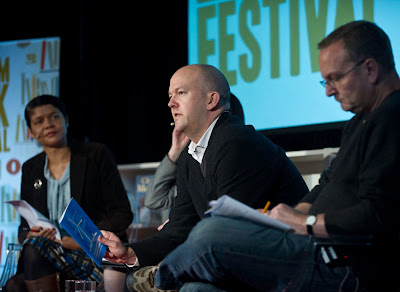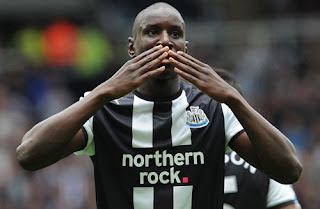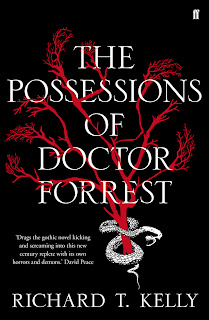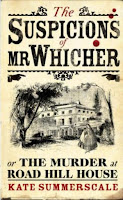
Last month I had two distinctive engagements at the Durham Book Festival: the first being the furthering of my nefarious plot to re-infect the modern world with Late Victorian Gothic (for
a report on which see here); the second the presentation of an essay commissioned from me by the Festival and addressing the prospects for the economy of North East England in the depressed years that lie ahead. That essay was published locally as a pamphlet, and
its text is available online here.
I discussed the essay's various arguments in a panel event on Saturday October 22, chaired by the
FT’s Chris Tighe, at which I was privileged to sit down and reason alongside Chi Onwurah, Labour MP for Newcastle Central, Paul Woolston (chair of the North East Local Economic Partnership) and Professor John Tomaney from the Centre for Urban and Regional Development Studies (CURDS) at Newcastle University. I found the session very energetic, with some good pointed contributions from the floor, though inevitably more dimensions to the debate were opened up than could be adequately explored within the time-slot.
I spent several months mulling over/interviewing for/writing up the essay, an absorbing experience. Can I summarise my findings? Well, I suppose I came to my brief feeling – as I had
when I last addressed the subject for Prospect back in 2008 – that the North East is blessed by its industrious heritage, its natural resources, and its people, with all their rightly legendary qualities of resilience; and yet also beset by its particular and substantive share in Britain’s long twentieth-century decline. Even in 2008, as one sensed the tide going out again, it was easier to feel buoyed by the benefits the region had enjoyed from new kinds of jobs, urban regeneration, better living standards. Today, with UK PLC in such a hole, one has to worry for a region under a government that undervalues its strengths and doesn’t believe in ‘regions’ anyway; a government, moreover, that is offering a ‘growth plan’ not unreasonably described by David Miliband (that’s the MP for South Shields) as
‘risibly, depressingly thin.’We’ve known for long enough that British business needs to innovate more in profitable new growth sectors and to export more of that innovation to emerging markets. Apparently our main innovation goes in the fields of market research, advertising and branding, management consultancy... Not what my granddad would have called ‘proper work’, though a living, for sure. But if your chief skills are selling hot air and processing bullshit you can’t claim surprise if your former ‘emerging market’ then becomes your master.
The thing people in the South East especially like to forget about the North East is that it still makes stuff and exports it: fine and bulk chemicals and pharmaceuticals; tracks and cast armour for tanks; diggers, and a whole lot of cars at Nissan. The North East’s subsea sector has had global stature for three decades. (The transoceanic fibre-optic cables that enable our keen use of the internet are there thanks to seabed trenching technology originated at the firm of SMD in Wallsend.) Hitachi is readying to turn out bi-mode train carriages in Durham; the blast furnace at the former Corus steelworks in Redcar has re-fired under new ownership.
Lest people be unaware, the North East now does both metal-bashing and key-pushing. (Witness the FTSE-measured success of the Sage software group, an inspiration to the region’s recent rash of digital technology start-ups.) It has several world-class universities capable of translating research into commerce, most impressively in life sciences. In all the North East has notable comparative advantages, skills that aren’t so prevalent in the rest of the world; not to mention indigenous raw materials, gold beneath its feet, an entirely plausible claim to be the hub of any future low carbon/clean energy economy.
True, the region is deficient in financial services (but then lately that sector has stuck us with its own ‘dependency’, and attendant strife.) The North East has rather weightier assets, which could yet make a hefty contribution to ‘rebalancing’ the national economy.
The challenge for North East business is how to be sufficiently nimble and entrepreneurial at a time when a state-dependent outlook appears forlorn. Traditionally the region has viewed entrepreneurs as rather rare birds. Throughout the last century the done thing for North Easterners was to work for someone else, whether the Coal Board or British Steel, ICI or the Department of Work and Pensions. And yet it wasn’t ‘working for someone else’ that begat the North East’s great industrial heritage: the entrepreneurial honour-roll of Armstrong, Palmer, Merz, Reyrolle – inspired engineers who made big things happen out of little, beginning with a wager.
Heavy industry has its own fiery kind of historical romance; yet in the era of The Apprentice we know that business innovation can take lighter but still lucrative forms. Consider the more recent North East success story that is Greggs (est. 1951), which chose not to remain a ‘traditional’ baker, pleasant as that may have seemed – and a good job too, otherwise the big supermarkets would have eaten it alive. Instead it was Greggs that did the consuming, of other smaller companies, and built a new brand as a first-rate seller of takeaway food that still does a fair bit of baking.
Much as I enjoy a sausage roll, I don’t propose that the Greggs business model has universal application. But I do believe Greggs offers a useful model of ethos and drive, of seeking out the best available niche in a market that could do with a bit of entrepreneurial development, ‘a properly-engineered solution.’ Spare capacity in our economy is there to be unleashed within our Small-to-Medium Enterprises (SMEs). But one can’t wag one’s finger at them, demand that they speculate to accumulate, adapt or else die. Innovation is expensive, and rarely yields a fast profit. Hiring and training aren’t cheap either, and in the North East as around the UK the skills employers require are not being readily met by the labour pool.
Right now it would seem only government can provide the impetus to the far-sighted investment in innovation and infrastructure that we know we need. Adam Posen, the American economist on the Bank of England Monetary Policy Committee, has made eloquent calls for a state investment bank that will bypass our tarnished banking sector and lend directly to businesses. Training (and re-training) schemes in hi-tech engineering, digital and green energy vocations would not be wasted. And renewed claims for infrastructure spending, good old-fashioned ‘capital projects’, have force to them: they will create jobs, and remedy a long national deficiency. From transport links to power lines to superfast broadband... we are going to need these things if we’re to have any sort of future.
A Conservative-led government is always liable to be leery of ‘industrial policy’, with its connotations of Labour, a pre-Thatcher era and a North where it has few friends. But I believe a forward-looking Tory ought to think fully on what the state can do as an engine for economic growth, not merely a dispenser of hardship funds. And as a potential engine room for such growth, the North East is fully stocked with tools and resources.
Then again,
the excellent analyst/blogger Chris Dillow has been brave enough to propose that maybe no policy fix is possible, since long-term growth
“is determined by factors which governments cannot control, such as entrepreneurial spirit or the rate of monetizable innovation.” But it’s those very ungovernable factors in which one is therefore forced to invest whatever hope one has lying around spare...
 So Gilbert Adair is gone, and the fine tributes that have followed already are a splendid expression of his achievements as a writer, as well as the good friends and impressions that he made everywhere.
So Gilbert Adair is gone, and the fine tributes that have followed already are a splendid expression of his achievements as a writer, as well as the good friends and impressions that he made everywhere. 






































